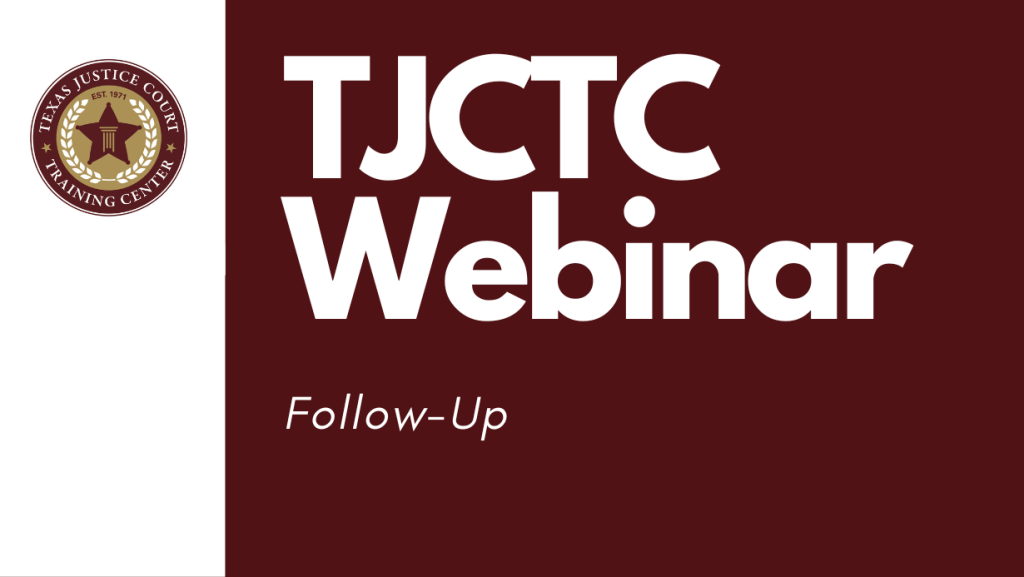
Online Training & More
This week we have a few resources and legal questions along with some reminders for available online trainings.

Legal Question of the Week
Question: Can a plaintiff in a debt claim file one petition against one Defendant but have multiple claims? Example: Plaintiff ABC Legal filed one petition against Defendant Jane Doe listing count 1 – Discover bank charge off account purchased by ABC Legal. Count 2 – AMEX CC charge off account purchased by ABC Legal. Shouldn’t the plaintiff file a petition for each separate debt?
Answer: Yes, if the case is between the same plaintiff and defendant (looks like it is, because ABC Legal now owns all of the debts), then they can be filed in the same case, even if there are multiple contracts/debts. The plaintiff could also choose to file as two separate cases. It is up to the plaintiff on how they choose to file the case. Note, this applies to all small claims (not just debt claims) – multiple causes of action can be handled in the same case if the total damages fall below $20,000.

Upcoming TJCTC Webinars

Clearing Your Docket While Helping Your Community: An Update
June 5th from 2:00 – 4:00 pm
This webinar will be an overview of strategies to clear criminal case dockets while ensuring that indigent defendants’ rights are protected. It will include information about Omnibase holds, waiver of fines and fees, community service plans, other indigent assistance strategies, and include relevant legislative updates
Register for the Webinar: https://txstate.zoom.us/webinar/register/WN_spcexLIFROSVykhcZrpsZg#/registration

Justice for All: Navigating the Legal Landscape of Animal Cases in the Courtroom
July 18th from 1:00 – 3:00 pm
This webinar will address the role of the justice of the peace in animal cruelty cases, as well as other animal-related laws appearing before the court. In doing so, it will touch upon dangerous dog cases, serious bodily injury cases, civil seizures, appellate process, and thinking outside the box when working with the parties for the greater good of the community.
Register for the Webinar: https://txstate.zoom.us/webinar/register/WN_bo5YIvbJQxucJmrU07lp3Q#/registration
Upcoming NCSC Webinars
Courts & Accommodations for Users with Disabilities
Tuesday, May 20 at 2:00 pm CT
This webinar will explore how courts implement accommodations tailored to the diverse needs of individuals with disabilities. We will discuss how courts can handle accommodation requests and provide guidance on best practices for making informed decisions that enhance accessibility. To enrich the learning experience, we will use hypothetical scenarios to illustrate real-world scenarios and the decision-making processes involved.
Note, this webinar is not sponsored by TJCTC, but judges and court personnel may submit proof of attendance for general judicial education credit.
Register to the Webinar: https://ncsc-org.zoom.us/webinar/register/WN_oknT1T1GT82-Gt0LAdhBkw?utm_campaign=731104_Whats%20on%20May%2019%20%28new%29&utm_medium=email&utm_source=newsletter&utm_content=v-0&dm_i=7L57,FO4G,4VW08I,2ICK4,1#/registration
AI-Assisted Translation in the Courts: Exploring Opportunities and Navigating Risks
Wednesday, May 21 at noon CT
In this webinar, we will candidly discuss the potential risks associated with AI translation tools, distinguishing between applications with varying levels of sensitivity — such as translating court forms versus court transcripts. The webinar aims to provide participants with a balanced understanding of the potential benefits and risks of AI-assisted translation in the courts, empowering them to make informed decisions about its implementation and use.
Note, this webinar is not sponsored by TJCTC, but judges and court personnel may submit proof of attendance for general judicial education credit.
Register for the Webinar: https://zoom.us/webinar/register/WN_ZUPPIm9pQLiEo5aV-UR30w?utm_campaign=731104_Whats%20on%20May%2019%20%28new%29&utm_medium=email&utm_source=newsletter&utm_content=v-0&dm_i=7L57,FO4G,4VW08I,2ICK3,1#/registration

6 Mental Health Tips from Psychologists
May is Mental Health Awareness Month
As we reflect on our mental health this month, why not look to the professionals for the best tips? The American Psychological Association just shared an article called 6 mental health tips psychologists use.
Make sure to also check out the Mental Health Awareness Month content that TJCTC has been sharing on LinkedIn and Facebook. Make sure to follow TJCTC on social media for tips like this as well as office closures and other important updates.


















